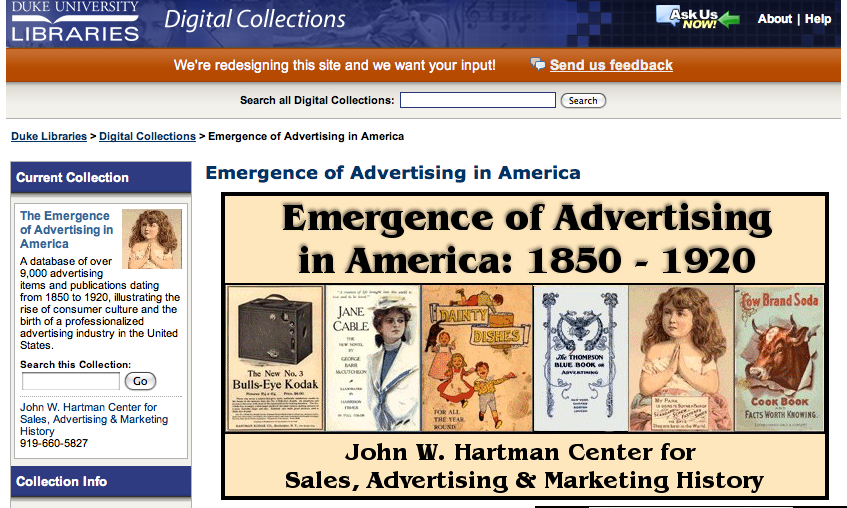
Image credit: screen shot of Emergence of Advertising in America database
On March 26th Noel will be leading our workshop on Best Practices for
Digital Images here at the DWRL and in preparation for that meeting many of us
at viz. are compiling several blog
postings on image databases. This
week Rachel posted about Radical Software—a database that provides access to work done in the ‘seventies with
the creation of and theorizing about digital and video media. I’d like to take us back even further
to a database dedicated to making available early advertising images from the
mid-nineteenth century through to the 1920s. I found Emergence of Advertising in America,
1850-1920 to be extremely entertaining to
browse and can easily imagine integrating it into my classroom practice.
The Emergence of Advertising in America, 1850-1920 is housed at the John W. Hartman Center for Sales,
Advertising and Marketing History as part of the Duke University
Libraries. The database is home to
over 9,000 images from the early period in American advertising. Because the strength of this collection
centers on the period of increasing professionalization within the field of
commercial advertising and the rise of national print magazines, this database
holds many many images that will be of use to those of us who work with visual
culture. Moreover, the ability to
access so many early advertisements may provide several unique opportunities
for the use of these images in our classroom. Obviously, these images would be useful for any unit
providing a history to advertising in this early period but I also think that
access to so many early ads might offer some contextualization for popular
advertising campaigns today.
Introducing students to these earlier advertisements may help to
denaturalize to pervasive nature of contemporary marketing tools.
The database is easily searchable—especially fun is to use
the search function to look up early advertisements for particular
products. Typing in “perfume” or
“soap” or “cola,” for instance, yields several fascinating results. Browsing through the collection strengths
was also amusing—the database has designated pages for the history of specific
campaigns, including Pond’s, Kodak, as well as for the history of particular
types of advertising strategies, including broadsides, trading cards,
calendars, and advertising cookbooks.
I hope this resource proves as useful for your research and your
pedagogy as it might for your entertainment.
Recent comments
2 years 29 weeks ago
2 years 44 weeks ago
2 years 44 weeks ago
2 years 50 weeks ago
3 years 4 weeks ago
3 years 4 weeks ago
3 years 4 weeks ago
3 years 6 weeks ago
3 years 6 weeks ago
3 years 6 weeks ago